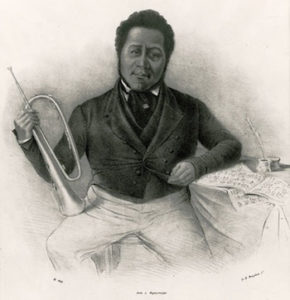
Frank Johnson
Frank Johnson was born on this date in 1792. He was a Black musician, bandleader, and composer.
Francis Johnson (his name at birth) was from Philadelphia, Pennsylvania. Little is known of his youth, and birth records indicate his status as a free Black. Though skilled at several instruments, Johnson seems to have first attained local prominence as a fiddler at dances, parties, and the like; there is some evidence that he played with Matthew Black's band in the late 1810s. Johnson also learned from Richard Willis, an Irish immigrant who later directed the West Point military band and introduced the keyed bugle (also known as a Kent bugle) to the United States.
During the 1820s, Johnson published more compositions, mainly dances and marches. He also developed relationships with several Philadelphia militia units, including the First Troop Philadelphia City Cavalry and the Washington Guards Third Company (later called the Washington Grays). Johnson's reputation in Philadelphia grew and won him national praise through this relationship and his participation in musical events with these groups. In 1824, he received two major commissions, one for much of the music for the Marquis de Lafayette's triumphant return to Philadelphia and another to score a revival of Joseph Cowell's "grand spectacle" of musical theater, The Cataract of the Ganges, at Philadelphia's Walnut Street Theater.
Johnson became a more creative musician during the late 1820s and early 1830s. He stayed in Philadelphia, teaching black and white students, giving concerts, composing, and publishing. He spent summers performing at resorts and the rest of the year touring the Northeast. During this time, his work for the centennial of George Washington's birth was performed as part of the Washington Grays' 1832 visit to Mount Vernon. Johnson attracted some of the best Black musicians of the day to his band.
In 1837, he added William Appo, Aaron J. R. Connor, Edward Roland, and Francis Seymour to travel with him on a British tour. Their repertoire ranged from Mozart and Rossini to popular American songs; the band switched from brass to strings and even sang. When they returned to the United States the following year, Johnson had brought a silver bugle, presented to him by the young Queen Victoria after a command performance. His time in England exposed him to the work of Johann Strauss (especially his waltzes) and the promenade concert begun by Philippe Musard. This led Johnson to compose several of his waltzes, which were popular throughout the late 1830s and early 1840s.
The international experience also influenced the first American promenade concert in Philadelphia during the 1838 Christmas season, marking the beginning of a musical tradition that continues into the 21st century. Between 1838 and his death, Johnson toured as far as Toronto. He also traveled to St. Louis on a St. Louis fire company commission. In off months, he composed, published, and taught from his home in Philadelphia. In March 1841, he conducted a 50-piece orchestra and a 150-voice chorus led by Morris Brown, Jr., in a performance of Hayden's Creation. His 1843-1844 promenade concerts offered the first integrated concerts in the United States.
Although scholars have begun to document Johnson's public career, little is known about his personal life. He married Helen Appo (sister of his bandmate William Appo), but the date is unknown, and this may not have been his first marriage. Also, little is known about how Johnson dealt with the many incidents where he faced racial discrimination. Johnson had a straightforward presence on the stage. His extensive conducting and composing were a radical statement about race and politics, while most of his music generally fit with the styles and topics of the day. Pieces like his "Recognition March on the Independence of Haiti" and "The Grave of the Slave," however, based on a Sarah Forten poem published in The Liberator, emphasized issues of racial discrimination.
His dance music centered on entertainment; his martial music was heavily nationalistic. Though occasionally innovative in composition, Johnson consistently entertained audiences. His "Philadelphia Firemen's Cotillion," dedicated to the city's fire association, evidently included fire bells, a field bugle, and the band shouting, "Fire! Fire!" Such work often included improvisation, leading some critics to suggest Johnson was a distant forefather of ragtime and jazz. A savvy businessperson and respected musician, he adapted his band from a four-piece group (with Johnson on bugle) for marching, to a larger military band (including woodwinds and French horns), to a Quadrille Band and Cotillion Band (in which some of the wind players switched to strings).
Johnson was at the forefront as American tastes shifted toward early brass bands. Johnson was one of the most prolific early American composers (with well over two hundred published pieces), the first Black person to publish sheet music, and the first (formal) Black musician. He was arguably the first American musician to tour Europe with a band and one of the first to participate in integrated public concerts. He mentored some successful Black musicians, and scholars credit him as the leader of the Philadelphia School of composers, arguably the first such group in the United States. His compositions remained in print until the late 19th century and experienced a resurgence in the late 20th century.
Frank Johnson fell ill in March 1844 and died in Philadelphia on April 6, 1844. During his funeral march, hundreds of mourners, including his brass band, followed his casket, on which his silver bugle was placed. Over a century later, in 1980, the Washington Grays named Johnson an honorary member.
Africana The Encyclopedia of the African and
African American Experience
Editors: Kwame Anthony Appiah and Henry Louis Gates Jr.
Copyright 1999
ISBN 0-465-0071-1